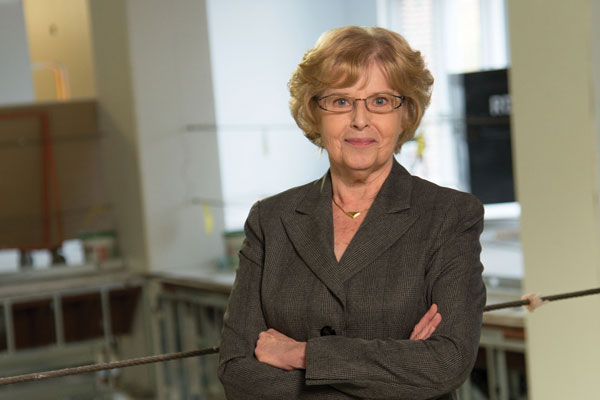Embracing Person-Centered Care
by Erich Van Dussen
When she joined Nazareth’s faculty in 1991, Shirley Szekeres, Ph.D., was excited to teach after years of hands-on work as a speech-language pathologist. Before her first year was over, she was pleased to discover that she had found a new calling—and surprised to find yet another career dimension reveal itself immediately, with the offer to chair her department.
That request was the first step of a journey some would consider inevitable for a talented educator—from clinician to professor to administrator—and for the last decade, as dean of the School of Health and Human Services (SHHS), she has led the growth of a vibrant and innovative part of Nazareth’s academic community. “But I’ve always been a clinically oriented person, and part of me has missed being actively involved in my profession,” she says.
And so, like the veteran athlete who feels most at home on the field, Szekeres is putting herself back in the game—by “retiring” as dean to take on a new director role of the Wellness and Rehabilitation Institute (WRI), a brick-and-mortar testament to the SHHS model of interprofessional clinical education.
When it opens next fall, the WRI will provide not only a headquarters for the varied SHHS departments—speech-language pathology, art and music therapy, physical and occupational therapy, nursing and more—but also ample room for clinical practices that bring needed services to underserved individuals while giving students early exposure to hands-on learning opportunities. Nazareth students provided thousands of therapy sessions for clients from the community last year, Szekeres says—a trend that will only grow under the WRI.
Even more importantly, the institute will function like an incubator for the blooming philosophy of person-centered care that already distinguishes learning within SHHS. “It’s simply about thinking of the whole person first,” Szekeres says. “The client is best served when their speech-language pathologist, for example, recognizes that the individual’s needs might be best met through adding a complementary discipline like music therapy or art therapy.
“The goal is to have our students understand not only their fields, but also how their work fits with related disciplines, and how to collaborate with other specialists to provide the best results for clients,” she adds. “We’re teaching students to be the most effective, efficient, and caring clinicians they can be.”
“The WRI reflects in many ways what Nazareth is all about. It serves our students, but it also serves the community,” says Nazareth President Daan Braveman. “And Shirley’s vision, and her ability to inspire others, have been instrumental to making it happen.”
For Szekeres, her new role offers an exciting blend of every phase of her professional life: She’ll teach at least one course again, and work with students and clients in an authentic clinical environment, while keeping more of a balance between setting policies and actively carrying them out.
“I love coming up with ideas, but I’m even more fulfilled by the chance to make those ideas happen,” she says. “This is going to be exciting.”
Erich Van Dussen is a freelance writer in Rochester, New York.

Shirley Szekeres, Ph.D., director of WRI